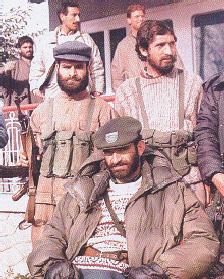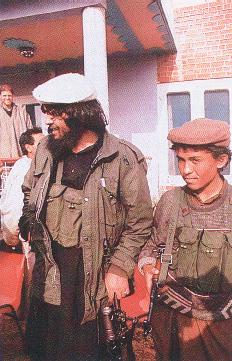|
"THE NEW ISLAMIST INTERNATIONAL" OF TASK FORCE ON TERRORISM AND
UNCONVENTIONAL WARFARE SET UP BY US HOUSE REPUBLICAN RESEARCH COMMITTEE
EXCEPTS FROM THE REPORT
- Dated February 1, 1993.
Sponsoring international
terrorism and separatist subversion and insurgency is not new to Pakistan.
Since the 1970s, Islamabad has been training Sikh and other Indian
separatist movements as part of Zulfiqar Ali Bhutto's strategy of
"forward strategic depth", and also as a part of his effort to
gain revenge for India's support of an independent Bangladesh..... is not new to Pakistan.
Since the 1970s, Islamabad has been training Sikh and other Indian
separatist movements as part of Zulfiqar Ali Bhutto's strategy of
"forward strategic depth", and also as a part of his effort to
gain revenge for India's support of an independent Bangladesh.....Thus, the further militarization and radicalization
of the Sikh armed struggle increased, as larger quantities of high quality
weapons became available. Among the novelties of the revived terrorist campaign
were sophisticated bomb making techniques and better training for Sikh
terrorists of the Dal Khalsa separatist movement in the Afghan Mujahideen
camps. Indeed, Sikh 'trainees' were killed in a Soviet raid on an Afghan
training camp in Pakistan
and their documents were seized......
The extent of the external, that is Pakistani and
Afghan, influence on the Islamist transformation of the Kashmiri insurgency is
quite clear. Indeed, Kashmir was the only area in India where, as of the
mid-]980s, Islamic revivalism had "taken a radical political stance"
and where "the slogans of the Islamic state have been publicly
raised" and had been received with growing popularity. The population was
increasingly adopting the leadership of Jamaat-i-Islami of Pakistan and
Khomeynists representing the
"following of the line of Imam Khomeyni" as their own leaders.
Consequently, by 1984, an Islamic radicalization had developed that saw the
rise of such movements as the Jammu and Kashmir Liberation Front,
Mahaz-i-Azadi and the Liberation League.
Later, by 1985, both the Jamaat-i-Islami and Al-Jihad
movements, the latter "a clandestine organization influenced by the
ideology of the Iranian revolution," were becoming highly influential in
Kashmiri politics. Indeed, the Al-Jihad movement publicly raised the issue of
an "Islamic Revolution" as "the only way to liberate"
Kashmir in the mid-1980s. Thus, in the space of a few short years, "there
was a marked erosion of the secular Kashmiri p ersonality
and a Muslim identity with fundamentalist overtones started emerging
rapidly". Therefore, it also became imperative for the emerging
separatist leaders to "give the struggle a Pan-Islamic character and
extra-territorial dimension."
Indeed, as noted, this transformation was assisted
and reinforced by an active ISI program. Initially, the emphasis of this
program was on using the Afghan-support infrastructure in Pakistan to support
Kashmiri militants. Indeed, during the main escalation of Islamist violence in
Indian Kashmir in mid-l988, Pakistan provided assistance in the training and
arming of Kashmiri terrorists, as well as sanctuaries to Kashmiri insurgents
across the border. At times, the ISI's assistan ce
to the Kashmiri Islamists was even funnelled through Afghan rebel leader
Gulbuddin Hikmatyar's Hizb-i-Islami group, thus providing Islamabad with
deniability.....
In 1986, with growing experience in training,
organizing and running the Afghan mujahideen, and with military supplies
available (through US, Saudi, and other foreign assistance), Pakistan began
expanding its operation to sponsor and promote separatism and terrorism,
primarily in Kashmir, as a strategic long-term program. A mong the most crucial
activities
of the ISI were the following:
- "Religious fundamentalism was propagated in
small but lethal doses to promote separatism and communal outlook".
- "Training and indoctrination
of selected leaders from the Kashmir valley was arranged to create
militant cadres".
- "A large number of youth from the Kashmir
valley and Poonch Sector were given extensive training in the use of
automatic weapons, sabotage and attacks on security force. Automatic
weapons and explosives were now issued to these people".
- "Special teams were trained to organize
agitations and hartals, and to engineer incidents to damage the
democratic and secular image of India".
Thus the rise of Islamist ideology to  predominance
throughout Indian Kashmir facilitated the emergence of a tight link between
the Kashmiri insurgents, their supporters, and Islamabad. Thus, it was with
the widespread adoption of Islamist ideologies that Kashmiri Muslims could not
seek ideological sustenance from a transnational Islam, while simultaneously
basking in the guaranteed patronage from across the border. Concurrently, for
the Pakistani defense establishment, the Kashmir cause constituted a
combination of regional interest and commitment to the global Islamist cause.
"Muslim fundamentalists
in Pakistan... see the Islamic surge in Kashmir as the long awaited hour for
jihad against Indian infidels, a holy war for which Pakistan must funnel
material and moral backing"..... predominance
throughout Indian Kashmir facilitated the emergence of a tight link between
the Kashmiri insurgents, their supporters, and Islamabad. Thus, it was with
the widespread adoption of Islamist ideologies that Kashmiri Muslims could not
seek ideological sustenance from a transnational Islam, while simultaneously
basking in the guaranteed patronage from across the border. Concurrently, for
the Pakistani defense establishment, the Kashmir cause constituted a
combination of regional interest and commitment to the global Islamist cause.
"Muslim fundamentalists
in Pakistan... see the Islamic surge in Kashmir as the long awaited hour for
jihad against Indian infidels, a holy war for which Pakistan must funnel
material and moral backing".....
There is a profound difference between support for Sikh
terrorism in Punjab, which is a matter of harassing New Delhi, and Islamist
terrorism in Kashmir, where there is a genuine whole-hearted commitment to
Jihad.
Furthermore, in the increase of support for terrorism
in India, Islamabad has been able to find a task for the Pakistani and Afghan
cadres that Islamabad had developed during the Afghan War and must now keep from
meddling in Pakistani domestic politics. Indeed, to secure that goal, Brig (Rtd.),
Imtiaz, head of the ISI Political Section, has developed a long-term program
called 'K-2'.
The 'K-2' program is aimed at unifying and better
coordinating the Kashmiri and Sikh subversion efforts by "bringing under
one umbrella Sikh and Kashmiri extremists and Muslim fundam entalists
who would then intensify acts of violence in Punjab, Jammu and Kashmir, and the
Terai region of Uttar Pradesh. "Indeed, the escalation of terrorism and
subversion since the early 1990s is believed to have been a direct outgrowth of
the ISI's implementation of the 'K-2' long-term program .....
The ISI established and runs its own "Kashmiri
organization". The most important among these are the Hizb-i-Islami, which
is comprised of former Kashmiri Mujahideen who were trained by the ISI and then
fought with Gulbuddin Hikmatyar's organization in Afghanistan. Also, there is
Harakat-ul-Jihad another highly professional terrorist group created in
Pakistan. It is made up of veteran 'Afghans' from Afghanistan, Pakistan, and
Kashmir who receive extensive ISI support....
By early 1991, the importan ce
of the Pakistani-Afghan terrorist infrastructure for the international Islamist
movement further increased as a result of changes in Libya in the aftermath of
the economic sanctions that were imposed on the country because of Qadhafi's
support for international terrorism.
The Libyans assisted in the upgrading of the terrorist
infrastructure in the camps of the Afghan resistance both inside Pakistan and
just across the border in Afghanistan, because, as Qadhafi pointed out,
"Afghanistan is open to anyone who wants to train".
By then, as the fighting in Afghanistan was grinding to
a near halt, the Islamist Mujahideen were shifting more and more attention to
the training of thousands of "brethren" from all over the Muslim
world. Some 2,000-3,000 volunteers were in the Khost area alone in early-1991.
The organized transfer of training installations to several camps in
Pakistan-Afghanistan began in the summer of 1991 and still continues as
terrorist
teams arrive from Libya or via other countries.
For example, some 30-35 Libyan
expert terrorist
trainers arrived in Peshawar in November 1991 with the declared objective
"to train national liberation forces" in Mujahideen camps, mainly
those of Gulbuddin and Sayyaf.
It is noteworthy that the Arm ed Islamic Movement also
played a major role in the consolidation of the capabilities
of the Islamist terrorists. In the spring of 1991,13 Kashmiri Islamists were
accepted for about 6 months of highly specialized terrorist training in Sudan
under the personal supervision of the Sudanese leaders Turabi and Mustafa Uthman.
By then, AIM's leader, al-Turabi, had already visited Pakistan and Afghanistan
in September 1991 to coordinate terrorist support activities.
Indeed, Jam'at-i-Islami (Pakistan), Hizb-i-Islami and
Jamiat-i-Islami (Afghanistan) and Hizb-ul-Mujahideen (Kashmir) had all bccome
members of the Turabi-led Popular International Organization (PIO), and, in this
capacity, provided assistance to, and clos ely
cooperated with, Islamists from Egypt, the Hizbullah in Lebanon, FIS in Algeria,
and NIF in Sudan. PIO members exchanged experts and cooperated in joint support
and training activities.
In the early-summer of 1992, some 200 highly-trained
and well armed Afghan Mujahid een
infiltrated into Indian Kashmir in order to assist in what was by now a full
blown armed struggle. They are directly responsible for the increase in violence
in Kashmir, in itself a part of a concentrated effort sponsored and backed by
the ISI.
Another group of 300 A fghans
in command of a larger force of Pakistani- trained Kashmiris are waiting in
Pakistani Kashmir for the opportune conditions in order to infiltrate into
Indian Kashmir and open a new terrorist front.....
ISI's vast and highly experie nced
terrorist support infrastructure, tempered by years of assistance to such
regional armed struggles as those in Afghanistan and India, is increasingly
expanding its operations to include and sponsoring of global Islamist
terrorism. At present, the Armed Islamic Movement supports and trains Islamist
terrorists and fighters for Jihads throughout the world from centers in
Afghanistan and Pakistan.
|
